Bernard Szajner, "Superficial Music"
 Bernard Szajner is a significant and influential figure in the composition and performance of electronic music. He created Superficial Music mainly from recordings of his earlier album Visions of Dune; by reversing tapes, slowing to half speed, mixing and adding effects. The intriguing results sound harmonious, anxious, consistently stunning and emotionally involving. The 1981 release is now reissued with relevant bonus tracks and extensive liner notes.
Bernard Szajner is a significant and influential figure in the composition and performance of electronic music. He created Superficial Music mainly from recordings of his earlier album Visions of Dune; by reversing tapes, slowing to half speed, mixing and adding effects. The intriguing results sound harmonious, anxious, consistently stunning and emotionally involving. The 1981 release is now reissued with relevant bonus tracks and extensive liner notes.
Bernard Szajner was born in Grenoble as WWII was ending. His Polish Jewish parents hid him in a cave out of fear of the Nazis and of deportation. It may not be a coincidence that he became interested in magic lantern phantasmagorias, automatons, and other spectacles of darkness, light and sound. Szajner worked as a lighting engineer and laser technician for Gong, Magma, and The Who, and on projects such as the Crystal Machine and the Laser Harp. Eventually, tired of dealing with egos, frustrated by lack of funds, and unable to find musicians to compose for his visual displays, he got a synthesizer and learned how to produce the sounds he needed.
Visions of Dune was Szajner's response to Frank Herbert's epic adventure. It didn't do too well but resulted in a commission from Amnesty International to compose a 30 second piece for an anti-death penalty commercial. This led to Some Deaths Take Forever, his concept album exploring the feelings of two prisoners on death row, which was voted Melody Maker's Record of The Week and in their Top 10 LPs of The Year. Szaner would also work with Howard Devoto on Brute Reason; a project mostly ignored or panned by critics.
The title is a deliberate contradiction and comes from Graham Greene's Journey Without Maps which mentions "superficial music which just tickled the surface of the mind, didn't tiresomely claim any deep emotion whether grief or exaltation." The music is some of the most extraordinary musique concrete available anywhere. Perhaps that is down to the integrity of the original Visions of Dune blueprint, but Szaner's use of electronic percussion, pitch change feedback, and drone is done with such a deft touch that nothing sounds like a gimmick, or merely included for shock value. On the contrary, it sounds as if an orchestra is playing perplexing music in a very distant room. I found the short piece "Superficial Music 2" particularly affecting, but the entire album is involving and accessible, while never really trying for overtly emotional territory.
Also included is Oswiecim (the Polish word for Auschwitz, the death camp where more than a million people were killed from 1942-45) a three part work dealing with Szajner's extended family's experience of the Holocaust. Oswiecim originally was side two of Superficial Music. For this CD reissue, two extra tracks (from 1982) are a welcome addition in terms of quality and similarity of sound. Szajner abandoned music for many years (after a deal with Island records) disillusioned that his work was being trivialized by the sole focus on his Laser Harp. LTM's excellent reissue is quite timely, as now, after 16 years away from music (working in theater, painting and light sculpture) Szajner has no less than four new albums ready for release. One of these was apparently composed entirely with digital pencil and piano samples. It would seem that Bernard Szajner has lost neither his experimental drive nor his technical skill. He has belatedly received several prestigious awards in France and I expect he will be name-checked by younger admirers as his work is rediscovered.
samples



